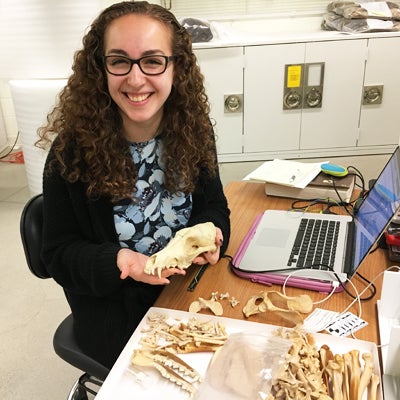In URI’s College of Arts and Sciences, students often choose to double or triple major, ensuring they get a multifaceted education without having to pigeonhole their passions. When it comes to exploring different passions and figuring out how to combine them, Kathryn Fish ’20 is an expert. Fish, originally from upstate New York, began her time at URI as an anthropology major. After taking an anatomy course that sparked her interest in functional anatomy and how it applies to human evolution, Fish decided to double major in biology. “The combination of the anthropology major that is based on the four-field approach — biological anthropology, archaeology, cultural anthropology, and linguistic anthropology — with the biology major allowed me to learn about a wide range of topics that often times intersected with each other, offering multiple perspectives that made my education at URI exactly what I was looking for,” Fish says.
While at URI, Fish was a research assistant for Dr. Holly Dunsworth, professor of anthropology. She cleaned, sorted, and identified animal skeletal remains. After investigating one particular skeletal remain, Fish and Dunsworth found their research might be helpful when identifying “dog domestication in the fossil record when a skull is not available” or as “additional support for the analysis of the skull.” Fish also says this research helped initiate her two Arts and Sciences Fellowship opportunities at the Harvard Museum of Comparative Zoology and the American Museum of Natural History respectively. These fellowships proved to be an amazing learning experience for Fish where she got to be hands-on in her research. “I was incredibly lucky to have permission to be a visiting scientist in these spaces, work with the incredibly helpful collections managers, and collect data from specimens that helped answer my research questions,” she says.
About her time working with Professor Dunsworth, Fish notes: “She taught me how to think like a biological anthropologist and how to pursue research questions in meaningful ways. One of the most valuable skills I learned from her is to think critically about science. In her classes, we discuss papers we read with a critical lens and work to understand the possible biases scientists have that may impact their work.” Fish says that having a close relationship with your professors and other faculty members is imperative when looking for fellowship opportunities. “Even if this is your first time getting involved in research,” she says, “don’t be afraid to share your ideas with a potential mentor and have those really fun conversations exploring topics, research questions, and potential hypotheses.”
Fish is now pursuing a Ph.D. in Human Paleobiology at George Washington University. When asked if she had any advice for current URI students studying anthropology or biology, she says, “Students should take advantage of professors’ office hours, research opportunities, and the wide variety of classes offered in both anthropology and biology. The professors are such a good resource for you to discuss anything from research interests to what you want to do after graduation, and you will learn so much from them in addition to class material. A more general piece of advice is to study what you are passionate about. This may mean trying out new things and exploring different majors, but it is worth it to be happy with what you are studying because that will really make your time at URI special.”
~ Written by Taylor Petrini ’21, English major


